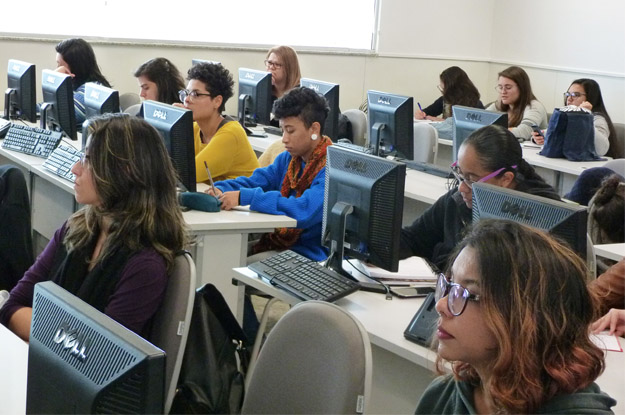Camila Achutti grew up fascinated by code. Her father was a programmer and as a kid she’d listen intently as he dictated lines of COBOL, an English-like programming language, by phone.
“It was this language that only select people spoke,” says the 25-year-old tech entrepreneur from São Paulo. “I wanted to be part of that group.”
Achutti’s interest only grew in Brazil’s tech-savvy environment. In sheer numbers, Brazil is one of the most internet-connected countries on earth: Nearly 140 million Brazilians have home internet access, twice as many as a decade ago. The country is one of the world’s biggest markets for social media sites like Facebook, Twitter, and YouTube; Facebook runs its Latin America operations out of São Paulo, Latin America’s largest tech hub, and Google set up its first regional Campus, a co-working and incubation space, there. It’s a sector that is growing despite the country’s economic troubles: according to the Associação Brasileira de Startups, the sector has grown 20 percent over the last two years, with investors pouring R$4.5 billion ($1.5 billion) into tech companies in 2016.
But just as Silicon Valley tries to address widespread allegations of gender discrimination, Brazil’s tech sector faces its own diversity issues: Women account for only 13 percent of start-up entrepreneurs in São Paulo, according to city officials. And though around 60 percent of university students nationwide are female, they make up fewer than 15 percent of computer science students at many of Brazil’s major universities.
“It’s still common to hear people say that women simply aren’t interested in technology or that they don’t have an aptitude for logic,” says Iana Chan, a program manager at a São Paulo tech accelerator. In 2015 she co-founded PrograMaria, an initiative that aims to bring more women into the tech sector. One of her first goals was to understand why so few women were entering her field.
“These are cultural narratives that go back to childhood,” she says. “Girls play at home with dolls, and boys play with video games.” Chan says when she was growing up the family computer and video games belonged to her brother. “There were boy things and girl things, and I could play when he wasn’t using them,” she says. She says that once they get to school, girls often internalize stereotypes that they aren’t as good at math as their male peers, making them less likely to pursue careers in STEM (science, technology, engineering, and math) fields.
Achutti ran into these stereotypes, and the barriers they erect, on her first day as a computer science student at the University of São Paulo. She was the only girl in her class and felt she had to work twice as hard to prove she deserved to be there.
“You walk into a room and everyone’s a guy and it feels like they’re all looking at you,” she says. “I felt like I didn’t belong.”
Looking to connect with other women in her field, she started a blog, Mulheres na Computação (Women in Computing). It resonated—today the site has 30,000 unique monthly visitors.
Barriers to entry for black women are even tougher. Silvana Bahia, director of programming at Olabi, a social enterprise that hosts a collaborative workshop, in Rio de Janeiro, says the lack of diversity in tech reflects broader problems of inequality in Brazil. There are no reliable statistics on black Brazilians in tech, but Bahia points out that in 121 years only seven black women have graduated from the University of São Paulo’s Polytechnic School, one of the country’s most prestigious engineering programs.
Bahia says many black Brazilians don’t have access to economic opportunities, quality education, and technology necessary to advance in the field. “The other issue is a lack of references,” she says. “If you don’t see people who look like you in these spaces, then you’re probably going to feel you don’t belong there.”
Last year Bahia launched PretaLab, an initiative to map, count, and connect black and indigenous Brazilian women who work in tech with the goal of increasing their visibility and encouraging more women to join the field. She opened the network to the public in March, and within a month more than 300 women had signed on.
Since she graduated in 2013, Achutti has co-founded two start-ups: Ponte21, an innovation consulting firm, and MasterTech, an education center that offers workshops and online classes in coding, design, marketing, and business. Together, the companies employ 50 people – and are already creating more opportunities for women. Sixty-one percent of MasterTech’s more than 1,000 students are female.
Chan has also found a tremendous demand. In March, her PrograMaria held a daylong women’s-only workshop that offered an introduction to web design and basic coding. Online signups for the course filled up within three minutes and generated a 180-person waitlist.
“The interest is there,” Chan says. “What’s missing are opportunities directed at women.”
But those opportunities are increasing. In March, officials in São Paulo organized the city’s third annual women’s tech competition, Prêmio Mulheres Tech em Sampa. More than sixty entrepreneurs competed, and five won R$10,000 cash prizes to develop their proposals. Also in March, Microsoft Brasil, whose CEO is a woman, Paula Bellizia, launched a campaign to encourage girls and young women to learn code. And techies across the country have organized women’s-only hackathons, like RodAda Hacker, where women with diverse backgrounds and skill sets meet for training and mentorship, and to collaborate on projects.
The fruit of these efforts are new products geared toward women. Last month São Paulo-based ad firm BETC launched Woman Interrupted, an app that tracks the number of times its user is interrupted each day. Género e Número, a feminist think tank, launched Braços Dados, an app that allows its user to discretely message emergency contacts when she feels she is in danger. The app’s creators say it may also help authorities map high-risk areas.
Chan says apps likes these demonstrate the importance of diversity in the workforce. “Tech has a fundamental importance in how we communicate, how we buy, learn, and how we relate to one another, and it’s unlikely these apps would have been created by made up only of men,” she says. “How many problems are not being resolved because women aren’t involved?”
—
Renwick is a freelance journalist based in Brazil








